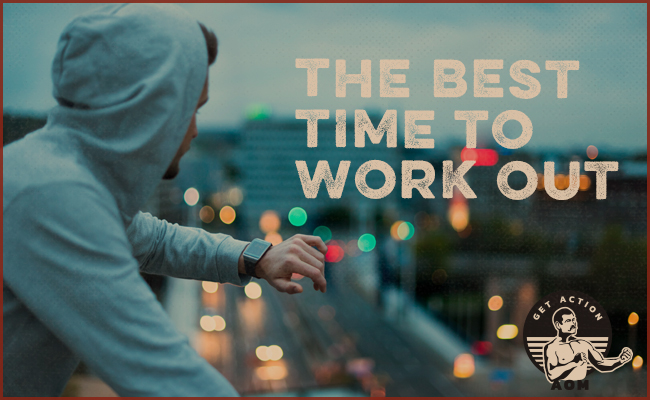
When you think about your workouts, you probably focus primarily on their content — the kinds of exercises you’re going to do.
While the what of your workouts is certainly of highest importance, you might also give a little consideration to their when. (Indeed, the timing of many things in life can be an underrated component in their results.)
As we’ll unpack below, figuring out the best time to exercise depends on your goals.
If Your Primary Goal Is Weight Loss: Work Out in the Morning
The research suggests that exercising in the morning can help with weight loss in two ways.
First, a few studies have shown that exercising in the morning before breakfast (i.e., on an empty stomach) can increase fat loss compared to exercising later in the day.
In addition to helping you burn more fat when you exercise, research suggests that working out in the morning can help you control your appetite throughout the day. If you burn more calories through exercise, and eat less calories from food, you’ll unsurprisingly lose weight.
If Your Primary Goal Is Performance: Work Out in the Afternoon/Early Evening
If your goal is to get bigger, stronger, and faster, then according to the research, you should schedule your workouts for the afternoon or early evening. Here’s why:
Increased body temperature improves performance. Your body temperature increases throughout the day and peaks between 2 p.m. and 6 p.m. Elevated body temperature enhances performance in a variety of ways.
A warmer body is a more supple body. Muscles and tendons are looser. You just feel less stiff working out in the afternoon compared to the morning.
Increased body temperature also helps glucose metabolism. When you’re lifting weights or running a 5K at a brisk pace, glucose is your primary fuel source. The more efficiently your body can metabolize glucose, the more energy you have to push through a tough workout.
Increased body temperature is also associated with faster nerve transmission, which helps with explosive movements like weightlifting and sprinting. For example, a few studies have shown that power output in cyclists peaks around 6 p.m.
Increased muscle mass. Studies have shown that individuals who train later in the day put on more muscle mass than those who work out in the morning. One theory as to why is that your body has less cortisol in its system later in the day compared to in the morning. Cortisol is catabolic, meaning it breaks down muscle tissue. The less cortisol you have in your system after a training session, the less your muscle will break down, leaving you with more muscle mass. Again, this a theory. Further research needs to be done.
Will Working Out Late in the Day Mess Up My Sleep?
Experts have long suggested that working out closer than four hours or so before bedtime could disrupt your sleep because exercise elevates body temperature, raises heart rate, and stimulates the nervous system. But a 2018 meta-analysis of studies on the subject showed that exercising up to an hour before bed does not affect sleep quality.
You’ll have to experiment with this one to see how exercising close to your bedtime affects your slumber.
My Experience With Morning and Evening Workouts
Up until several years ago, I worked out in the morning. I liked the idea of starting my day with physical exercise and getting my workout done and over with before the sun came up.
But then I moved from working out in a commercial gym to working out in my garage gym, and my garage sits directly underneath my kids’ bedrooms; the sound of my barbell thunderously hitting the floor upon completion of each deadlift started waking them up at 5:30 a.m. I had also soured on early rising in general; I just felt tired throughout the day. So I started waking up later (these days, at least with school out, I get up around 8 a.m.) and shifted my training to the late afternoon.
I really like it, and don’t think I’d switch back, even if the early morning noise factor wasn’t an issue.
I’ve noticed an improvement in my performance with training in the afternoon. My body just feels warmed up and ready to go compared to training in the morning. I don’t have any numerical proof that my performance has improved since making the switch. It just feels better.
The one downside of training in the afternoon is that during the summer, it’s crazy hot in the garage compared to how much cooler it would be in the morning. I just turn on a big box fan and roll with it.
The Best Time to Work Out Is the Time You Can Work Out Consistently
So if your primary goal is to lose weight, the research suggests exercising in the morning.
If your primary goal is optimum performance, the research suggests exercising in the afternoon/early evening.
But what if your schedule doesn’t allow you to optimize your training time? What if you want to train for performance, but the only time you can get a workout in is in the morning?
Well, then you work out in the morning.
Working out consistently is more important than timing your workout perfectly. Find out what time works best for you — both in how you feel and what your schedule allows — and stick with it. Don’t let the perfect be the enemy of the good.


